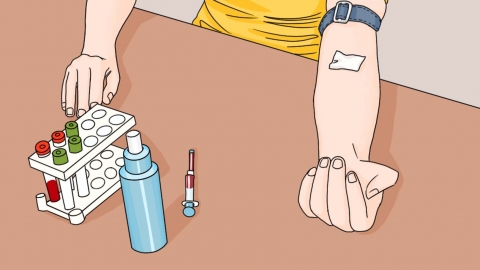What does it mean if serum alanine aminotransferase (ALT) is high, and what should be done?
Under normal circumstances, the main causes of elevated serum alanine aminotransferase (ALT) include staying up late and fatigue, excessive alcohol consumption, non-alcoholic fatty liver disease, viral hepatitis, and drug-induced liver injury. If discomfort symptoms occur, it is recommended to seek timely medical evaluation and treatment at a正规 hospital. Specific analysis is as follows:
1. Staying Up Late and Fatigue
Long-term sleep deprivation or overexertion prevents the liver from getting adequate rest, increases metabolic burden on liver cells, and leads to mild liver cell damage, resulting in elevated serum ALT levels. Adjusting sleep patterns, ensuring 7–8 hours of sleep per night, avoiding heavy physical labor and prolonged熬夜, and rechecking after 1–2 weeks usually allows levels to return to normal.

2. Excessive Alcohol Consumption
Alcohol is primarily metabolized in the liver. Excessive drinking produces acetaldehyde, which damages liver cells and disrupts cell membranes, causing ALT to be released into the bloodstream and leading to elevated levels. Alcohol intake should be stopped immediately, all alcoholic beverages avoided, and a light diet adopted to reduce liver burden, with regular follow-up liver function tests.
3. Non-Alcoholic Fatty Liver Disease (NAFLD)
Excessive fat accumulation within liver cells compresses and damages hepatocytes, impairing normal liver function and causing ALT elevation. Under medical guidance, medications such as polyene phosphatidylcholine capsules, silybin capsules, or diammonium glycyrrhizinate enteric-coated capsules may be used. Additionally, controlling caloric intake and increasing physical activity can help reduce hepatic fat accumulation.
Infection with hepatitis B virus (HBV), hepatitis C virus (HCV), or other viruses triggers inflammatory responses in the liver, damaging liver cells and releasing ALT into the blood. For HBV, medications such as entecavir tablets, tenofovir disoproxil fumarate tablets, or adefovir dipivoxil tablets may be taken under medical supervision. For HCV, treatments include sofosbuvir tablets, velpatasvir tablets, or glecaprevir/pibrentasvir tablets. Patients should avoid fatigue during treatment and have liver function monitored regularly.
5. Drug-Induced Liver Injury
Long-term use of hepatotoxic drugs such as ibuprofen sustained-release capsules or isoniazid tablets can damage liver cells through the drugs or their metabolites, leading to increased ALT levels. Suspicious medications should be discontinued immediately. Under medical guidance, medications such as reduced glutathione tablets, compound glycyrrhizin tablets, or bicyclol tablets may be administered. Liver function should be regularly rechecked, and similar drugs avoided in the future.
In daily life, it's important to maintain a regular schedule and avoid staying up late or overexertion; control alcohol intake, ideally abstaining completely; eat a balanced diet low in high-fat and high-sugar foods; consult a doctor before taking any medication to avoid self-medicating with potentially hepatotoxic drugs; and undergo regular health checkups to detect liver issues early.





